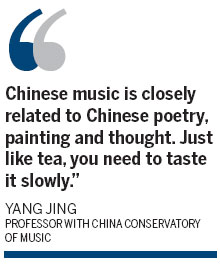Life and Leisure
Deafening applause as the pipa pulls Polish heart strings
By Mu Qian (China Daily)
Updated: 2010-10-19 07:56
 |
Large Medium Small |
A Chinese quartet dazzled the audience at the recently held Warsaw Cross-Culture Festival that brought together rhythmic music from around the world.
The concert hall became extremely quiet as the four Chinese women started playing their instruments - pipa (lute), yangqin (dulcimer), guzheng (zither) and erhu (fiddle) - very gently.
The audience, which had been clapping all along to the beats of the other groups, listened attentively, before bursting into deafening applause at the end of each piece.
With a name that sounds as Chinese as their music - Qing Mei Jing Yue - the quartet comprises four women virtuosos of Chinese music - guzheng player Fan Weiqing, erhu player Yu Hongmei, pipa player Yang Jing, and yangqin player Liu Yuening. The name of the group comprises a character from each of their names.
When performing at festivals around the world, such as the Chicago World Music Festival, Hong Kong International Midi Music Festival and Prague Spring International Music Festival, they always find that their music has a distinctly calming influence on the audience.
According to Polish concertgoer Mareu Wojtkowski, "The music of Qing Mei Jing Yue takes me to the China of centuries ago.
"It makes me want to discover more about the culture of China."

Pipa player Yang, a professor with the China Conservatory of Music, says most people are still not familiar with Chinese music and find it very exotic. Also, Chinese music, like all good music, cuts across cultural boundaries.
"We use different instruments, but ultimately Chinese music is like any other music in what it expresses - people's feelings toward life and nature," says Yang, who is actively involved in several music groups, including the Forbidden City Chamber Ensemble and avant-garde musician Liu Sola's band.
The other three members of Qing Mei Jing Yue are also well-known music educators and soloists. Liu and Yu are both professors with the Central Conservatory of Music, while Fan is a soloist with the China Radio Orchestra of Traditional Chinese Music.
Since their debut in 1996, the quartet has performed at many festivals around the world. Wherever they go, they see their concerts not just as performances, but also as opportunities to promote Chinese music.
"Chinese music has a long history and rich forms, and is closely related to Chinese poetry, painting and thought," Yang says. "Just like tea, you need to taste it slowly."
But the group does not only look to the past. They have invited contemporary composers to write new works for them and have reinvented traditional pieces into new arrangements.
Their program for the Warsaw festival included traditional instrumental works like Spring River on a Flowery Moonlit Night, adaptations of such folk songs as In a Faraway Place, and commissioned works like Tang Jianping's Heart Rain.
They also try foreign works. An adaptation of the Polish folk song Cuckoo was very well received.
"As China's economic influence grows, so will its cultural influence," says Marek Garztecki, art director of the Warsaw Cross-Culture Festival. "I'm sure we will hear more and more music from China in the future."
China Daily